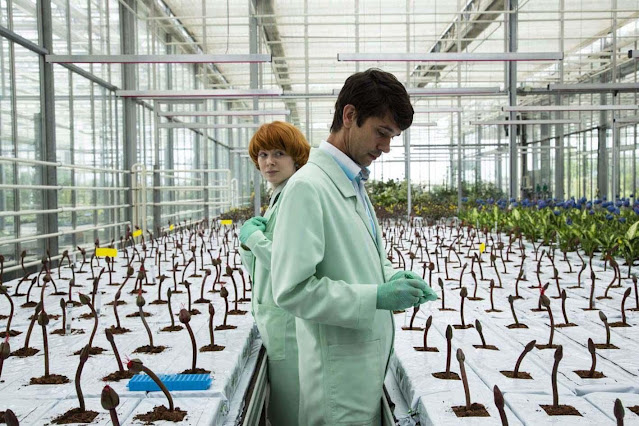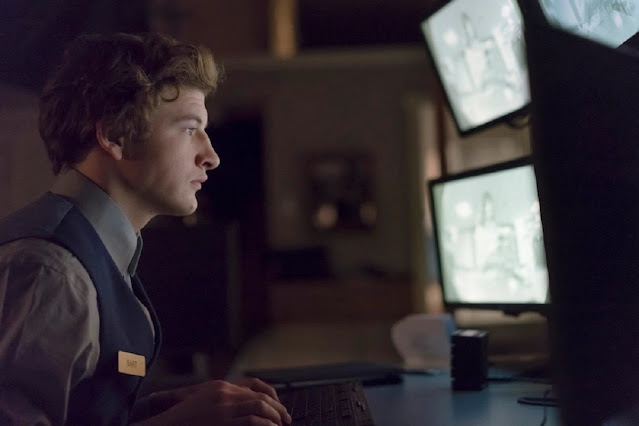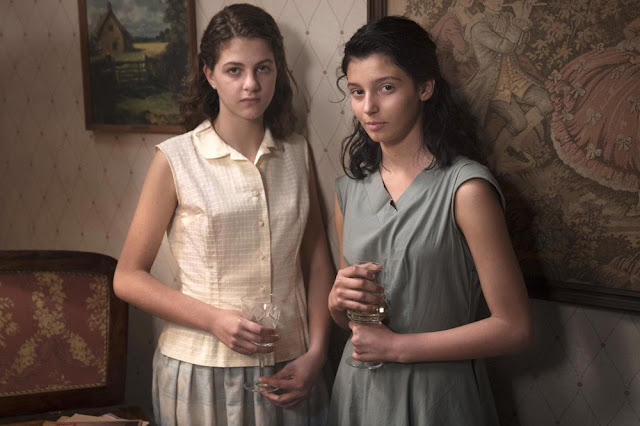Little Joe
(Español /English)
Alice (Emily Beecham) es una bióloga que trabaja en un instituto de biotecnología vegetal en Londres. Logró poner a punto por ingeniería genética una flor que en determinadas condiciones libera elementos que "ponen a la gente que las cuida feliz" y se dispone a presentarla en una feria . Pero con el tiempo se verá que los efectos acaso puedan ser otros.
Esta película de Jessica Hausner puede ser encuadrada dentro de varios géneros que van cambiando o se van combinando a medida que uno va viendo la película y la evolución de sus personajes: ciencia ficción, terror psicológico, thriller paranoide.
Como toda buena película de género, la película presenta un nudo dramático que lo trasciende y le da sentido: la relación de Alice, una mujer divorciada, con su hijo preadolescente Joe (Kit Connor), a quien ella regala una de sus flores (bautizada Little Joe en honor a él), relación que empieza a modificarse a partir de ese momento. Madre sobreprotectora y a la vez ausente por su devoción por el trabajo, estos cambios comienzan a horadar sus certezas profesionales. De este modo la película aporta una perturbadora mirada sobre la maternidad. Un proceso similar sufre Alice en su relación con Chris, un compañero de trabajo y posible interés amoroso (Ben Wishow).
La película puede ser interpretada como una relectura de otra cuya filiación incluso reconoce su directora, pero la profundidad psicológica y estilo de Little Joe son muy diferentes y más actuales y va mucho más allá de constituirse en una obvia metáfora sobre panaceas psicofarmacológicas.
Uno de los mayores atributos de este film es la elegancia hipnótica de su puesta en escena: las locaciones, los colores, la simetría, la iluminación, la fotografía, la banda sonora... pocas películas pueden darse el lujo de dejar imágenes iconográficas y potentes en el espectador y ésta es una de ellas. Sin dudas que el vivero y todo el Instituto quedarán en su retina.
Del mismo modo, cautiva la sequedad muy austríaca de los diálogos, que por momentos refuerza la atmósfera ambigua y paranoide.
El devenir de la investigación científica, las actitudes de los científicos y los aspectos bioéticos también se integran a la trama de una manera tan natural como necesaria y despiertan inquietantes ecos actuales en una película de 2019.
Las actuaciones dan con el tono justo. Emily Beecham ganó el premio a la mejor actriz en el Festival de Cannes 2019 por este papel.
En definitiva, una película fascinante por la hipnótica elegancia de su puesta en escena y por su inquietante combinación de ciencia ficción, terror psicológico, thriller paranoide y drama familiar con una perturbadora mirada sobre la maternidad.
Se puede ver AQUÍ hasta el 22/12
..........................................................................................................................................................
Fascinating
film by Austrian Jessica Hausner about the scientific development of a flower
that under certain conditions "generates happiness" in those who care
for them due to the hypnotic elegance of its staging and its disturbing
combination of science fiction, psychological terror, and paranoid thriller and
family drama with a disturbing look at motherhood.
Alice (Emily
Beecham) is a biologist working at an institute for plant biotechnology in
London. She managed to genetically engineer a flower that under certain
conditions releases elements that "make people happy" and is about to
present it at a fair. But with time she will see that the effects may be other.
This Jessica
Hausner film can be framed within several genres that change or combine as one
watches the film and the evolution of its characters: science fiction,
psychological terror, paranoid thriller.
Like any good
genre film, the film presents a dramatic knot that transcends it and gives it
meaning: Alice's relationship with her pre-adolescent son Joe (Kit Connor), to
whom she gives one of her flowers (named Little Joe in honor of him), a
relationship that begins to change from that moment on. An overprotective
mother and at the same time absent due to her devotion to her work, these
changes begin to pierce her professional certainties. In this way, the film
provides a disturbing look at motherhood. A similar process goes through Alice
in her relationship with Chris, a co-worker and possible love interest (Ben
Wishow).
The film can be
read as a rereading of another film whose parentage even its director
recognizes, but Little Joe's psychological depth and style are very different
and much more current and it goes far beyond becoming an obvious metaphor for
psychopharmacological panaceas.
One of the
greatest attributes of this film is the hypnotic elegance of its staging: the
locations, the colors, the symmetry, the lighting, the photography, the soundratck... few
films can afford to leave powerful and iconographic images in the viewer And
this is one of them. Undoubtedly, the nursery and the entire Institute will
remain in your retina.
In the same
way, the very Austrian dryness of the dialogues captivates, which at times
reinforces the ambiguous and paranoid atmosphere.
The evolution of
scientific research, the attitudes of scientists and bioethical aspects are
also integrated into the plot in a way that is as natural as it is necessary
and awakens disturbing current echoes in a 2019 film.
The
performances strike the right tone. Emily Beecham won the best actress award at
the 2019 Cannes Film Festival for this role.
In short, a
dazzling film for the hypnotic elegance of its staging and for its disturbing
combination of science fiction, psychological terror, paranoid thriller and
family drama that harbors a disturbing look at motherhood.





Comentarios
Publicar un comentario
Mensajes sujetos a moderación